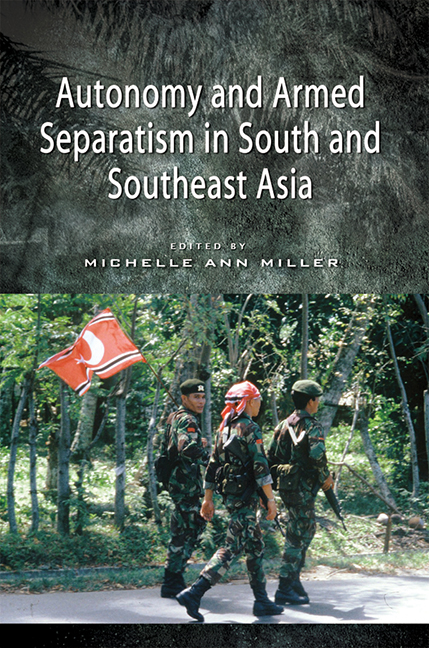Book contents
- Frontmatter
- Dedication
- Contents
- Acknowledgements
- About the Contributors
- 1 The Problem of Armed Separatism: Is Autonomy the Answer?
- 2 Mediated Constitutionality as a Solution to Separatism
- 3 Self-Governance as a Framework for Conflict Resolution in Aceh
- 4 Autonomy and Armed Separatism in Papua: Why the Cendrawasih Continues to Fear the Garuda
- 5 The Parallels and the Paradox of Timor-Leste and Western Sahara
- 6 Between Violence and Negotiation: Rethinking the Indonesian Occupation and the East Timorese Resistance
- 7 Struggle over Space in Myanmar: Expanding State Territoriality after the Kachin Ceasefire
- 8 Sri Lanka's Ethnic Conflict: The Autonomy-Separation Dialectic
- 9 Unitarianism, Separatism and Federalism: Competing Goals and Problems of Compromise in Sri Lanka
- 10 Autonomy and Armed Separatism in Jammu and Kashmir
- 11 Armed Conflicts and Movements for Autonomy in India's Northeast
- 12 Southern Thailand: The Trouble with Autonomy
- 13 The Last Holdout of an Integrated State: A Century of Resistance to State Penetration in Southern Thailand
- 14 Interlocking Autonomy: Manila and Muslim Mindanao
- 15 History, Demography and Factionalism: Obstacles to Conflict Resolution through Autonomy in the Southern Philippines
- 16 Conclusion
- Index
6 - Between Violence and Negotiation: Rethinking the Indonesian Occupation and the East Timorese Resistance
Published online by Cambridge University Press: 21 October 2015
- Frontmatter
- Dedication
- Contents
- Acknowledgements
- About the Contributors
- 1 The Problem of Armed Separatism: Is Autonomy the Answer?
- 2 Mediated Constitutionality as a Solution to Separatism
- 3 Self-Governance as a Framework for Conflict Resolution in Aceh
- 4 Autonomy and Armed Separatism in Papua: Why the Cendrawasih Continues to Fear the Garuda
- 5 The Parallels and the Paradox of Timor-Leste and Western Sahara
- 6 Between Violence and Negotiation: Rethinking the Indonesian Occupation and the East Timorese Resistance
- 7 Struggle over Space in Myanmar: Expanding State Territoriality after the Kachin Ceasefire
- 8 Sri Lanka's Ethnic Conflict: The Autonomy-Separation Dialectic
- 9 Unitarianism, Separatism and Federalism: Competing Goals and Problems of Compromise in Sri Lanka
- 10 Autonomy and Armed Separatism in Jammu and Kashmir
- 11 Armed Conflicts and Movements for Autonomy in India's Northeast
- 12 Southern Thailand: The Trouble with Autonomy
- 13 The Last Holdout of an Integrated State: A Century of Resistance to State Penetration in Southern Thailand
- 14 Interlocking Autonomy: Manila and Muslim Mindanao
- 15 History, Demography and Factionalism: Obstacles to Conflict Resolution through Autonomy in the Southern Philippines
- 16 Conclusion
- Index
Summary
At first glance East Timor appears to be an awkward fit in a volume on armed separatism and autonomy. The reasons for this are quite straightforward, one stemming from the definition of separatism, the other reflecting the ultimate outcome of the conflict. The Indonesian invasion of East Timor in 1975 was a violation of international law and Jakarta's act of “integration” in 1976 was never recognized by the United Nations or the vast majority of member states. The resistance explicitly justified its use of arms in terms of the right to self-determination and the illegality of the Indonesian occupation. Hence, the twenty-four year occupation was technically never a case of separatism. Second, while both sides periodically made proposals for peace (including calls for autonomy), these were readily dismissed by the other party to the conflict. Viewing “integration” as final and irrevocable, Jakarta rightly suspected that the resistance's proposals for autonomy were disingenuous ploys to open the door to eventual independence. The one exception to this arose in 1999 when President Soeharto's chosen successor, B.J. Habibie, agreed to a United Nations-sponsored referendum in which the people of East Timor were given the opportunity to support or oppose “special autonomy” within Indonesia. With the vote overwhelmingly opposed to Jakarta's offer, the referendum led to the opposite outcome — Indonesia relinquishing its claim over the territory and international recognition of East Timor's independence.
Despite these objections, the theme of this volume provides a useful opportunity to rethink the dynamics of the twenty-four year conflict and the reasons for the success of the East Timorese resistance. Most scholarship on the conflict in East Timor has focused on either the heroic resistance to the illegal occupation or the horrific human rights abuses committed by the Indonesian military/state. Curiously, far less attention has been paid to the long-term logic of the occupying power, including fluctuations in the use of violence and periodic efforts to employ negotiation. And yet, careful scrutiny reveals that the twenty-four year conflict in East Timor was punctuated like clock-work by something entirely exogenous to East Timor: the Indonesian electoral cycle. Corresponding to the national electoral cycle, at regular five year intervals the regime of occupation withdrew troops from the territory, reduced or altogether ceased combat operations, and attempted in one way or another to “normalize” the status of the territory.
- Type
- Chapter
- Information
- Autonomy and Armed Separatism in South and Southeast Asia , pp. 93 - 112Publisher: ISEAS–Yusof Ishak InstitutePrint publication year: 2012

